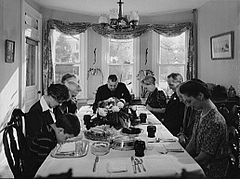Thanksgiving (US)
| Thanksgiving | |
|---|---|

Prayer before carving a turkey at Thanksgiving dinner in Neffsville, Pennsylvania, 1942
|
|
| Observed by | United States |
| Type | National |
| Celebrations | Giving thanks, prayer, feasting, spending time with family, football games, parades |
| Date | Fourth Thursday in November |
| Frequency | Annual |
| Related to |
Thanksgiving in Canada Thanksgiving in Norfolk Island Thanksgiving in Liberia Thanksgiving in Leiden, Netherlands Thanksgiving in Saint Lucia |
 |
|
|
|
Thanksgiving, or Thanksgiving Day, is a public holiday celebrated on the fourth Thursday of November in the United States. It originated as a harvest festival. Thanksgiving has been celebrated nationally on and off since 1789, after a proclamation by George Washington. It has been celebrated as a federal holiday every year since 1863, when, during the American Civil War, President Abraham Lincoln proclaimed a national day of "Thanksgiving and Praise to our beneficent Father who dwelleth in the Heavens," to be celebrated on the last Thursday in November. Together with Christmas and the New Year, Thanksgiving is a part of the broader holiday season.
The event that Americans commonly call the "First Thanksgiving" was celebrated by the Pilgrims after their first harvest in the New World in October 1621. This feast lasted three days, and—as accounted by attendee Edward Winslow—it was attended by 90 Native Americans and 53 Pilgrims. The New England colonists were accustomed to regularly celebrating "thanksgivings"—days of prayer thanking God for blessings such as military victory or the end of a drought.
Setting aside time to give thanks for one's blessings, along with holding feasts to celebrate a harvest, are both practices that long predate the European settlement of North America. The first documented thanksgiving services in territory currently belonging to the United States were conducted by Spaniards and the French in the 16th century.
Thanksgiving services were routine in what became the Commonwealth of Virginia as early as 1607, with the first permanent settlement of Jamestown, Virginia holding a thanksgiving in 1610. In 1619, 38 English settlers arrived at Berkeley Hundred in Charles City County, Virginia. The group's London Company charter specifically required "that the day of our ships arrival at the place assigned... in the land of Virginia shall be yearly and perpetually kept holy as a day of thanksgiving to Almighty God." Three years later, after the Indian massacre of 1622, the Berkeley Hundred site and other outlying locations were abandoned and colonists moved their celebration to Jamestown and other more secure spots.
...
Wikipedia
